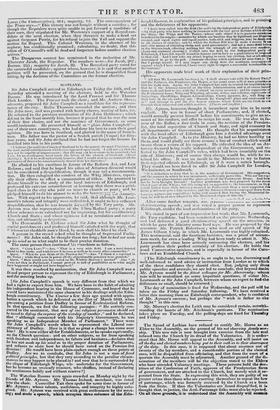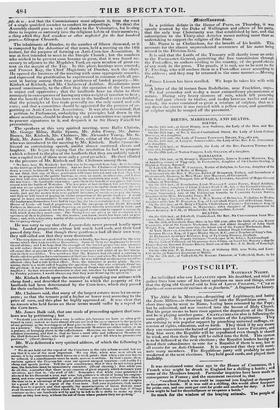The Synod of Lothian have refused to certify Mr. Home
as an Elder to the Assembly, on the ground of his not observing finnily wor- ship. This new rule is now brought into exercise from the late teal infused into the Church by its dread of the Voluntaries. It is under- stood that Mr. Horne will appeal to the Assembly, and will insist on all thaity and clerical members being put to their oath as to their observance of the duty. In this case, it is supposed that about nineteen out of twenty of the lay members, and a considerable portion of the clerical ones, will be disqualified from officiating, and that from the want of a quorum the Assembly must be adjourned. Another ground of the di- minution of the members will be the objection stated to the Elders who have attended Voluntary meetings. These persons hold the doc- trines of the Confession of Faith, approve of the Presbyterian form of government, and are attached to the Church, but merely wish it se- parated from the State. In expressing this wish, they are guilty of no greater ell inc than those who are exerting themselves to repeal the law of patronage, which was formerly received by the Church as a boon from the State. If then the Voluntaries are found disqualified, it is thought that, in justice, the Anti-Patronage folks must also be rejected. On all these grounds, it is understood that the Assembly will comuiii filo de se ; arid that the Commissioner must adjourn it, from the want of a single qualified member to conduct its proceedings. We think the Assembly should pass a vote of thanks to the Voluntaries, for le iding them to inquire so narrowly into the religious habits of their members; a thing which they had somehow or other neglected for tlw last hundred years.— Glasgow Chronicle.
The inhabitants of Dundee, to the number of fifteen thousand, as it is computed by the Advertiser of that town, held a meeting on the 14th instant, for the purpose of forming an Anti-Corn-law Association. It was at first intended to meet in the Steeple Church ; but the numbers who wished to be present soon became so great, that it was found ne- cessary to adjourn to the Magdalen Yard, an open meadow of great ex- tent on the margin of the 'lay. In this place, hustings were erected; and Provost Kay, the Chief Magistrate of Dundee, took the chair. He opened the business of the meeting with some appropriate remarks, and expressed the gratification be experienced in common with all pre- sent in having among them two gentlemen of landed property—Mr. Kinloch of Kinloch, and Mr. Chalmers of Auhlbar. Resolutions were passed unanimously, to the effect that the operation of the Corn-laws is unjust and oppressive ; that the landlords have no claim to their monopoly in consequence of having any extra weight of taxation to bear ; that the benefit of the Corn-laws even to the landlord is very doubtful ; that the principles of free trade generally are the only soiled and safe ones ; and that a committee should be appointed for the purpose of or- ganizing an Anti-Cormlaw Association. It a'as also determined, that a petition to Parliament, embodying the principles laid down in the above resolutions, should be drawn up ; and a committee was appointed to procure signatures to it, and despatch it to Sir Henry Parnell for presentation.
The speakers at this very spirited meeting, were Bailie Christie, Mr. George Millie, Bailie Symon, Mr. John Penny, Al r. James Brown, Mr. Kinloch, Mr. Chalmers, Mr. Alexander I ming, Mr. 0.
Buik, Mr. James Bulk, and Mr. Weir, editor of the Glasgow Argus, who was introduced to the meeting by Mr. Kinloch. Bailie Symon de-
livered an entertaining speech, amidst almost continual cheers and laughter. lie began by saying that the resolution he had to propose (which referred to the plea of the landlords that they are unfairly taxed) was a capital text, if there were only a good preacher. He then alluded to the presence of Mr. Kinloch and Mr. Chalmers among them.
" We have here Mr. Kinloch : but this was to lie expected from him—he is treading, in the fontateps of Ida lamented father. And we have Mr Chalmers of A tildbar laying flown a course to himself by which he w ill receive honour from every hocest m rfl. 1 do not think that any of these gentlemen will come roman]. and say that hey Lear more in proportion or the public burdens, or even SO much. as others do; :old I dare
say they w ill tits% without hesitation, coucur in the resulet now read. The taxes— the war taxes—the landlords' own taxes—gave them the benefit of war prices, lett t a.se ceased w it It the battle of Waterloo. The war price at last declined, but not the taxes; and no% are asked to give them still t he war prices to enable t twin to pay the w .tr taxes. If we don't get the war prices, they say we caul, pay the war taxes ; or. in other words, just put the money from your pockets into ours, to enable us to pay the taxes, and then we will boast of paying an melte. propirt ion of the iodine burden:. I collie/ appeal to many circumstances to couvinee pm, v....re it necessary. or the hand which the landowners themselves have had in iaipmlim, the taws complained or There is the lIo,ni of Lc:Ma—all lauded proprietors. Willi the exeeption of the BE:lit Reverend Fat I,,, is Mammon ; and I thiuk they even are pretty diremly interested ill land : and
they Wel so at this moment, ter they are all leagued as one man to support a is poly with which down they mmt tome. The Stamplawa are giveu Iii the resolution as a Speeinien of their legislation. On this matter, you know, 'noel' has been said III tions ; and, with a liberality worthy of the system, they generously resolved to abandon the twopenny stamps."
He was sorry to say that the Legacy-day never pressed hardly upon him. Landed proprietors seldom left much hard cash, and their land passed duty-free. But though these gentlemen bad all their own way, they still called out that they were distressed.
" The very distresa of which they complaint no loudly. has been produeed by the very means which they took to reline themselves. Some of lint are beginning to
;locosl of this and I do hope that the example of the lawled proprietors ism amongst
its will induce them to consider the question with valmness atit randonr. ou are sill aware. that at present the advocates for the Corn hi u.s ivill admit of nu free discus- sion in Owir asseaddies. You would see that Mr. Kitiloch had attended it meeting it, Perth called to petit ion for a coot inua nee or 'het:mu-law s tut when Mr. K jiiloeh us istnal to open their eyes—to enlighten them it little—he was toll that no discuas,on would he allowed—they had a rule to that effect. Now, the interence is pretty plain. In rea- soning, there is a mode called begging the question; but this was certainly Grant, in! the gnestion—it was one of the numerous family or Grants who made the rule. (Great laughter.) So that whenever discussion is shut out, whether by landed proprietors or by Paisley polemics, I would always say that they were Gratit-ing the ipiestam."
Mr. Kinloch dwelt upon the necessity of supplying our artisans with cheap food ; and described the manner in which the property of the landlords had been deteriorated by the Corn-laws, which they passed for their exclusive benefit.
Mr. Chalmers said, that many of the largest estates were let on corn- rents ; so that the tenants paid a higher or lower rent according to the price of corn, and this plan he highly approved of. It was clear that no tenants who held farms on these terms would suffer by a repeal of the Corn-laws.
Mr. James Built said, that one mode of proceeding against theCorn- laws was by petitioning ; but
" No doubt you will think this a very heartless job, because we have so often peti- tioned in vain ; indeed, we have almost always received the saute answers to the prayer:: of our petitions as the worshippers of Baal gave to theirs—, Either he is asleep, or ne is on a journey,' the great majority of onr honourable Members are either asleep or on a journey, or lounging about in the coffeehouses. However, we have some small con-
solation rem; ' and that is, that we have a most able and itifinential Member in the IlaltReforme71 House. who will give our cause a goal lift when he presents our petitions." (Great cheering.)
Mr. Weir delivered a very spirited address, of which the following is a sample.
" We do not hohl out the repeal of the Cormlaws as the only reform needed, but we say that it is one of the most impoltant. We say that, when wise men attack an enemy, it is by concentrating thew forces on a weak point; that when a forress has to be reduced, if a simultaneous onset be made, sileceSS is certain. In God's name. then, exclaim against the Pension-list—roar out against unequal taxation—call lustily 1. r cheap and speedy justice. Tell the new constauenev, that it' they do not return good men, the franchise mint be immediately extended. (Great cheering.) Ilut, while you du all this, remember that there is owe concern of great urgency which demands your attention. an I that is, • the staff of life.' Remember that while sonic pensioner is alarmed for his thousand a year. and some tax.gatherer is afraid of losite, his employ- meat, and some superannuated judge is afraid that you can do ithout'him—then as the time Iota • advantage of the gencial distraction, and to concentrate y our els rgies tin' a grand eff it for a lepeal of the Corn laws. Tell our legislators. that, mouse these ha .se lw repealed. and that speedily. llw manufacturers of Great Britain must avail themselves of the facilities which the Continent offers them ; and that. if things coutinue as they ;Ire. lantlIt.rds will by and by be left to th,ir shifts to make up their retards as they best may. without the aid of those whose pockets they are picking."





















 Previous page
Previous page